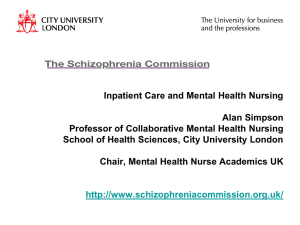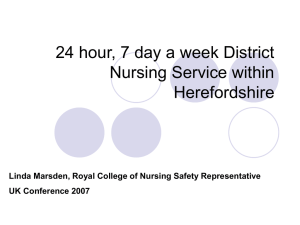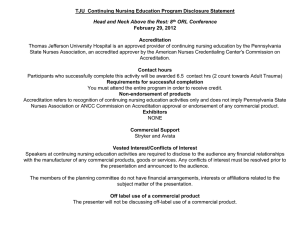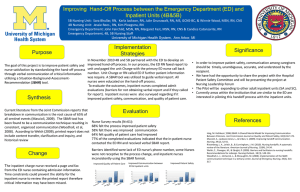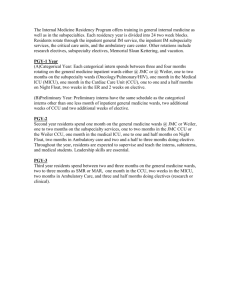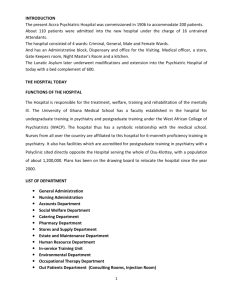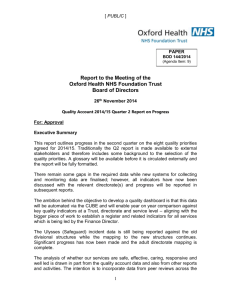44_BOD_COO-Report-April
advertisement
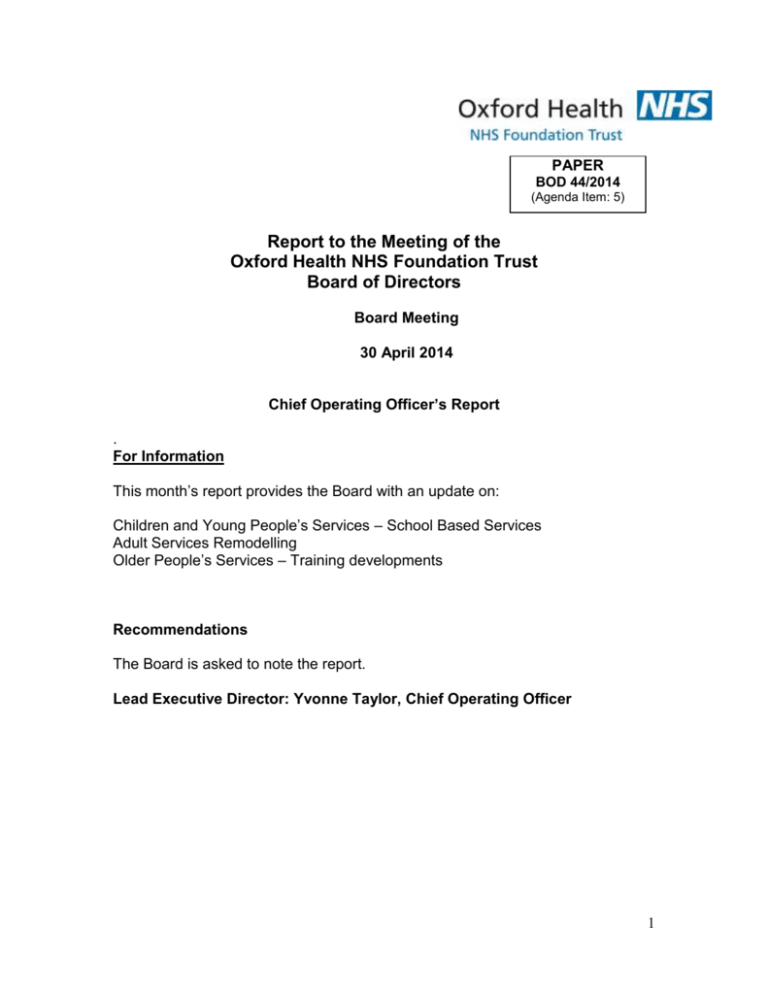
PAPER BOD 44/2014 (Agenda Item: 5) Report to the Meeting of the Oxford Health NHS Foundation Trust Board of Directors Board Meeting 30 April 2014 Chief Operating Officer’s Report . For Information This month’s report provides the Board with an update on: Children and Young People’s Services – School Based Services Adult Services Remodelling Older People’s Services – Training developments Recommendations The Board is asked to note the report. Lead Executive Director: Yvonne Taylor, Chief Operating Officer 1 1. Children and Young People’s Services The Children and Young People’s Directorate deliver school based health services across Oxfordshire. In May 2013, Oxfordshire County Council confirmed its intention to re-procure a range of public health services including school health nursing. Following our successful bid the Trust was awarded the contract to deliver school health nursing in Oxfordshire. We were also successful in winning bids to provide a healthy weight service for children and young people, school based immunisations and the national child measurement programme. We are working with colleagues in Oxford University Department of Psychiatry to ensure that we can evaluate the school based metal health pilot into schools, evaluating the service and improving the evidence base for interventions in schools. School services being delivered: School Health Nursing: there will be a school health nurse based in every secondary school, available 9.00am-3.00pm every school day to provide direct care and signpost to other services. The school nurses will work in partnership with the head teachers and board of governors developing a health plan for each school as well as delivering public health interventions across the school. At the request of commissioners we plan to trial nurses being in uniform in some schools and will get feedback from pupils, school nurses and teaching staff. School nurses will also work in primary schools and have an important role to play in early intervention helping children and young people to remain in school, managing illness as well as promoting good health, sexual health, the wider public health agenda, such as smoking cessation and safeguarding. School-Based Immunisations: Immunisation programmes for Human Papilloma Virus (HPV), Tetanus, Diphtheria and Polio (Td/IPV), Menigisitis C and Measles, Mumps and Rubella (MMR) will be delivered in each geographical area, to ensure children are protected College service: The college service will be fully integrated with the school health nursing service, offering a seamless transition for young people as they enter further education National Child Measurement Programme: Children in reception and year 6 are now having their height and weight measured, which number exceeding national targets, allowing proactive follow-up to improve their long-term health outcomes Healthy Weight Management Service: The Trust was successful in winning this contract against strong national competition, and is now delivering a bespoke weight management programme for children and families across the county School-Based Mental Health Service: An innovative pilot study is being launched to base 3 mental health workers in Oxford city schools, rising to 2 10 county-wide from September, to improve school-based mental health services and develop the evidence base for such interventions We are very excited about the opportunities school based services have for promoting good physical and mental health for children and young people and particularly the opportunities to work with secondary school head teachers and governors to impact on the lifelong health of the children and young people of Oxfordshire. 2. Adult Services Following an 18 month build programme Adult Services have successfully moved patients from the adult inpatient wards at the Tindal Centre into the new Whiteleaf Centre, where we now have two 20 bedded wards; one male and one female. The new site provides a modern, purpose built environment for the provision of inpatient mental health care and we have received a significant amount of very positive feedback about the new facilities. Our patients have told us that the environment has made a significant difference to their overall health and wellbeing and they have told the inpatient staff how, in particular, they value the en-suite accommodation and additional recreational space we have created within the ward footprint. All inpatient staff had an extensive period of training and induction, including specific scenario training around emergency responses for the new environments before they moved in. Staff have now been working there for approximately eight weeks and have told us that they are delighted to be working in such a warm and welcoming atmosphere and have reported that the environment has contributed to developing supportive and therapeutic relationships with their patients. Historically the recruitment of high quality staff has sometimes been a challenge for the inpatient wards in Buckinghamshire and we had hoped that this move would enable us to address some of these challenges with the new hospital being seen as an incentive to people to come and work for the Trust. We were therefore pleased that following formal interviews last month both Ruby and Sapphire wards now have a full establishment of qualified nursing staff, some of whom have come from other Trusts, and bring with them different and valuable professional experience. An extensive environmental improvement programme for the acute inpatient wards in Oxfordshire has been taking place over the last six months, and is now almost complete. This has included refurbishment of the bedrooms and bathrooms as well as the purchasing of new equipment for the wards (such as new televisions and games consoles) to support patients’ leisure time on the 3 wards. The wider remodelling of Adult Mental Health Services and the move into the new Whiteleaf Centre provided the opportunity to review existing clinical models. This piece of work, led by the Directorate Head of Nursing and Head of Service, has now been implemented is built around the Accreditation for Inpatient Mental Health Services (AIMS). This initiative from the Royal College of Psychiatrists is a standards based programme which looks to improve the quality of care on inpatient mental health wards. The accreditation assures staff, patients and carers, commissioners and regulators of the quality of the service that is being provided and the directorate are delighted that they have been able to use this tool to benchmark their existing models of care against. As part of remodeling services we committed to each inpatient ward having a dedicated Modern Matron, who, along with the Ward Manager and the Consultant Psychiatrist would form the clinical leadership team for each ward. We have been successful in recruiting to all of these newly created posts, and staff, some of whom have been recruited externally, will all be in post by the end of May. The role of the Modern Matrons is to support and ensure the delivery of high quality and safe patient care; they will also lead on patient and carer experience, ensuring that the wards will be supported by a leadership team of experienced senior staff. 3. Older People’s Services – Training Programme Developments The Sub acute skills programme was developed in response to the necessity to prepare and support staff in the management of patients with increasing subacute medical and nursing needs in the community. Previous courses had proven somewhat limited and were more theoretically based and lacked practical clinical application. In addition staff in clinical areas focused upon integrated approaches to health care delivery found that traditionally delivered training often fostered a silo approach. The Trust applied for and was successful in securing HETV funding to develop a sub-acute skills project. This has two main strands, 1. The development of an accredited (by University of West London at Masters Level) sub acute skills course with the aims of increasing the competence and confidence of staff to undertake comprehensive assessment of patients. 2. Development of a purpose built ‘skills lab’. The lab, equipped with manikins for wound care, suturing, blood pressure arms, manikin that can produce breath sounds, catheter models etc has proved to be an exceptionally useful resource to deliver the course to staff from across the Trust. Early feedback has been very positive with staff reporting excellent learning experience and some reporting improvements in their ability and confidence in 4 their management of clinical scenarios since the course in their workplaces. Further work is being undertaken by course leads to gain further accreditation with the University of West London for two further work based learning courses. These will be offered externally and internally and aim to be in place from Late summer 2014. There are two aspects to the Sub acute Skills course. The first was the development of the skills lab and the second the development of the accredited sub-acute skills ‘work based learning’ course. Skills Lab 1. We need skilled staff within the Trust to manage patients at home and within the Urgent care services. These practitioners see, diagnose and treat patients with minor injury and illnesses. It was becoming evident that although practitioners were training to masters/degree level and undertaking university courses that these staff were still not prepared when they came into practice and still had to be trained in certain competencies. 2. The increasing demand to manage acute patients at home in the community means that staff require some consolidation of skills to increase their competency and confidence as well as the development of other skills. The skills lab is nearly completed with just some outstanding equipment waiting to arrive. It is well equipped with manikins for wound care, suturing, blood pressure arms, manikin that can produce breath sounds, catheter models etc. The sub-acute skills course has started and is in its third week this week. The course was scoped within the community services and we are running three courses: 1. 40 Credit Minor Illness: Developing competency through work based learning course 2. 40 Credit Minor Injury: Developing competency through work based learning course 3. 20 credit Student negotiated award – developing competency through work based learning – to allow staff who need some skills but do not want to train in autonomous assessment. The first course has been accredited with the University of West London at Masters Level and the two other courses are going through the examination board of the University of West London on the 2nd May. We are offering the courses internally and externally. The course is running well thus far and we have had some very positive feedback from staff on the wards regarding their confidence and ability to 5 manage their patients in a more proactive way than previously. The course is practical based with some theory teaching but interactive and followed up with practical sessions where the students get to practice the examination techniques. The Skills Lab officially goes live in June and we already have a few bookings. We have run two acute deteriorating patient courses, one from the lab with the aims of : • Give an overview of the national and international developments to date aimed at supporting the adult who has the potential to become acutely unwell. • Understand that there are clinical signs of deterioration many hours before most life threatening events • Perform, analyse and interpret a rapid clinical assessment of a patient who is at risk of deterioration/medical emergency • Using Imperial MEWS/Local Trust tool to calculate risk, escalate care and become familiar with interdisciplinary communication. • Be confident in implementing initial interventions such as positioning and oxygen therapy. Be aware of appropriate medical therapeutics. • Be confident in accessing appropriate care pathways for a deteriorating patient. District Nursing Induction and Preceptorship The District Nursing Induction and Preceptorship Programme has been set up to address challenges around the long time frame that it has historically taken for some nurses new to the service to access training and development that is essential to their role and to help with both the role transition from being a student to being a registered practitioner and with skills development for those new to District Nursing. In addition to clinical skills development in areas such as pressure damage prevention and wound management and bowel and bladder care, participants on the programme also receive input on practical aspects of using the electronic patient record , ordering equipment and patient safety and incident reporting . The programme is organised and delivered by the Clinical Development Leads within District Nursing and subject matter experts from specialist teams. The five day programme occurs in the week following Trust Induction and ongoing support is provided through the initiation of a personal development plan and membership of an ongoing action learning set. Current members of DN Teams are also able to access sessions on an individual basis A cohort of clinicians have received training that will enable them to act as facilitators of action learning sets for nurses on the programme. 6 Qualitative evaluation of the programme has been positive and quantitative evaluation is planned following the completion of future cohorts as this will give more robust figures for analysis. Pressure ulcer prevention action Group A Trust wide action group meets bi monthly to review the pressure ulcer prevention action plan which has an overall aim of reducing avoidable pressure ulcers. 5 work streams form the structure of the action plan, each with its own lead who is responsible for coordinating the work plan. These are: 1. 2. 3. 4. 5. Integrated working with the Oxford University Hospital Trust (OUH) Education and competency frameworks Documentation and audit SSKIN bundles Working with formal and informal carers. This plan was and validated by the CCG Quality team at a meeting on 2nd April 2014. Achievements to date include: Pilot sites across OUH and Oxford Health which aim to improve patient information about pressure damage. Development of a national e learning programme which is now available for staff A competency framework which has been launched across community nursing teams Partnership working with local authority and the voluntary sector to help raise awareness of pressure ulcers Introduction of SSKIN bundle across older adult mental health wards (pilot sites). These initiatives and the work of the Oxfordshire Wound Advisory Group and the joint discharge action plan that has been developed in partnership with the OUH through the Discharge Oversight Group have had a positive effect in reducing the incidence of Grade III/IV pressure tissue damage. A total of 15 SIRIs have been reported since 1st April 2013, 8 fewer than the equivalent point last year. 13 of these relate to grade 3 or 4 pressure damage, 11 of which were reported by District Nursing teams and 2 by a Community Hospital. 7


